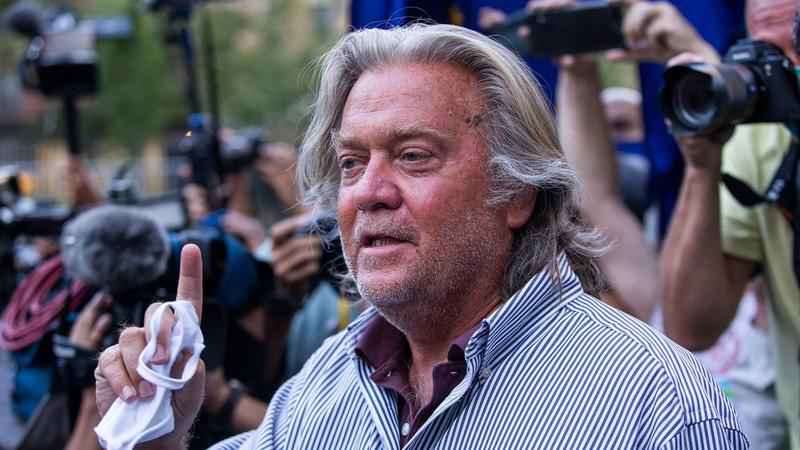Bannon won’t comply with subpoena from House Jan. 6 panel

In this Aug. 20, 2020, file photo, President Donald Trump's former chief strategist Steve Bannon speaks with reporters in New York. A lawyer for Bannon says Bannon won’t comply with a congressional investigation into the Jan. 6 insurrection at the Capitol because President Donald Trump is asserting executive privilege to block demands for testimony and documents.[AP Photo/Eduardo Munoz Alvarez]
A lawyer for Steve Bannon says the former White House aide won’t comply with a House committee’s investigation into the Jan. 6 insurrection at the Capitol because former President Donald Trump is asserting executive privilege to block demands for testimony and documents.
Two other witnesses subpoenaed by the panel, former White House Chief of Staff Mark Meadows and former Pentagon aide Kash Patel, are "engaging" with the committee, according to its Democratic chairman, Mississippi Rep. Bennie Thompson, and Republican vice chairwoman, Rep. Liz Cheney of Wyoming. Thompson and Cheney issued a statement Friday after a deadline for document production had passed.
"Though the Select Committee welcomes good faith engagement with witnesses seeking to cooperate with our investigation, we will not allow any witness to defy a lawful subpoena or attempt to run out the clock, and we will swiftly consider advancing a criminal contempt of Congress referral," the two lawmakers said.
A spokesman for the panel declined to comment on the status of a fourth witness, former Trump communications aide Dan Scavino.
Bannon’s move sets the stage for a likely clash with House Democrats who are investigating the roles of Trump and his allies in the run-up to the riot, when a large mob of Trump supporters broke into the Capitol as Congress was certifying the results of the presidential election won by Democrat Joe Biden. The committee is rapidly issuing subpoenas to individuals who are either connected to Trump or who helped plan the massive rally on the morning of Jan. 6 at which he told his supporters to "fight like hell."
Bannon’s refusal to comply, and Trump’s vow to litigate the testimony, will mean certain delays in the panel’s probe. But members of the committee, several of whom worked as prosecutors on Trump’s two impeachments, were prepared for the possibility and have repeatedly threatened charging witnesses with contempt. Trump often successfully fought witness testimony during his presidency, but may find his legal standing shakier now that he is out of office.
A committee effort to charge witnesses with contempt would likely involve a vote of the full House and a referral to the Justice Department. It would then be up to Justice how to proceed with charges.
Bannon’s lawyer, Robert Costello, said in an Oct. 7 letter to the panel that until the issues over privilege are resolved, "we are unable to respond to your requests for documents and testimony."
Costello wrote that Bannon, a former aide to Trump who had contact with him the week of the Capitol attack, is prepared to "comply with the directions of the courts" when and if they rule on the issue.
The letter includes excerpts from a separate letter sent to Bannon by Justin Clark, a lawyer for Trump. Clark says documents and testimony provided to the Jan. 6 panel could include information that is "potentially protected from disclosure by executive and other privileges, including among others the presidential communications, deliberative process and attorney client privileges."
Clark wrote to Bannon that "President Trump is prepared to defend these fundamental privileges in court."
Spokespeople for Trump have not returned messages seeking comment. Trump said in a statement last month that he would "fight the Subpoenas on Executive Privilege and other grounds, for the good of our Country."
Bannon is the only one of the top Trump aides subpoenaed on Sept. 23 who was not working for the Trump administration on Jan. 6. It is unclear whether that will affect his standing if the case moves to the courts.
Patel said in a statement that he will "continue to tell the American people the truth about January 6" but would not say whether he would comply. Scavino and an aide to Meadows have not immediately responded to requests for comment.
The issue can also become more complicated because Trump no longer is in office. As the former president, he cannot directly assert privilege to keep witnesses quiet or documents out of the hands of Congress. As the current president, Biden will have some say in the matter.
The Select Committee to Investigate the January 6th attack has issued more than a dozen subpoenas to people linked to plans for the Jan. 6 protests, including three additional witnesses announced Thursday. Those individuals would be less likely to get help from Trump’s executive privilege claims, since they did not work for the White House and most of them did not have regular contact with Trump.
The committee chairman, Rep. Bennie Thompson, D-Miss., said additional subpoenas had gone to Ali Abdul Akbar, also known as Ali Alexander, and Nathan Martin, as well the organization " Stop the Steal, " to learn more about a rally that was planned on the Capitol grounds at the same time as the larger gathering on the National Mall. The committee earlier subpoenaed 11 other individuals connected to the planning of the larger rally.